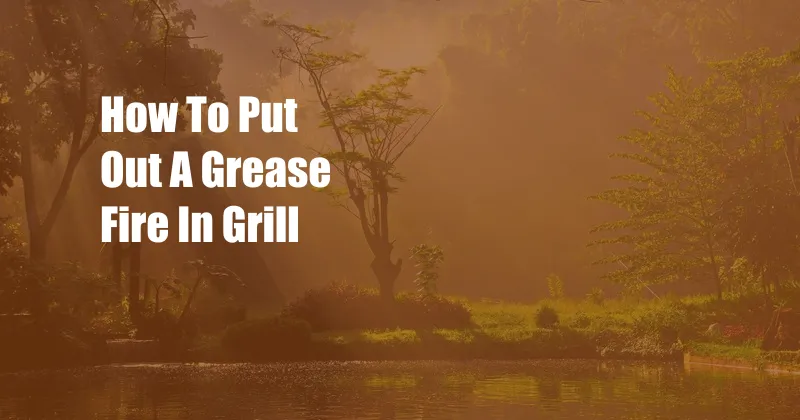
How to Extinguish a Grease Fire in a Grill Safely
As an avid grilling enthusiast, I’ve experienced my fair share of grill-related mishaps, including the dreaded grease fire. The intensity and potential danger of these fires can be alarming, but with the right knowledge and a calm demeanor, you can effectively put them out and prevent serious damage or injuries.
Grease fires occur when excess grease or oil on the grill ignites, often due to high heat or dripping grease onto an open flame. Understanding the nature of these fires and knowing how to handle them is crucial for every griller’s safety.
Subtle Signs of a Grease Fire
Before a full-blown grease fire erupts, there are often subtle signs that you should be aware of:
• Crackling and sputtering: If you hear these sounds coming from your grill, it could indicate that grease is starting to accumulate and burn.
• Smoke: A thick, black smoke rising from the grill is a clear signal that a fire is developing.
• Flare-ups: Small, sudden bursts of flame may occur as grease drips onto hot coals or flames.
Extinguishing a Grease Fire Safely
If you suspect or witness a grease fire on your grill, it’s imperative to act quickly and calmly. Here’s a step-by-step guide on how to extinguish it safely:
1. Turn Off the Gas or Heat Source
The first and most important step is to turn off the gas supply or heat source to the grill. This will cut off the fuel feeding the fire and prevent it from spreading.
2. Close the Grill Lid
If the fire is small and contained within the grill, closing the lid can help smother the flames and reduce the oxygen supply. Keep the lid closed for at least 15 minutes to ensure the fire is completely extinguished.
3. Do Not Use Water
Never attempt to put out a grease fire with water. Water will cause the grease to splatter and spread the fire, creating a dangerous situation.
4. Use a Dry Chemical Fire Extinguisher
A dry chemical fire extinguisher is the most effective tool for extinguishing grease fires. Aim the extinguisher at the base of the fire and discharge in short bursts. Keep a safe distance and allow the powder to blanket and suffocate the flames.
5. Use Baking Soda
If you don’t have a fire extinguisher handy, baking soda can also be used to put out small grease fires. Pour it carefully over the flames to smother them.
6. Call for Help
If the grease fire is large or out of control, do not hesitate to call for professional help from the fire department. Do not attempt to tackle a large fire on your own.
Tips and Expert Advice for Preventing Grease Fires
Preventing grease fires is always the best course of action. Here are some tips and expert advice to help you keep your grilling experience safe and enjoyable:
• Clean your grill regularly: Remove excess grease and food residue after each use to prevent buildup.
• Trim excess fat from meat: This reduces the amount of grease that can drip onto the flames.
• Use a grill pan or basket: These tools help contain grease and prevent it from dripping into the fire.
• Avoid overfilling the grill: This can promote grease accumulation and increase the risk of a fire.
• Stay alert and monitor your grill: Keep an eye on your grill while cooking and be ready to intervene if you notice any signs of a grease fire.
Frequently Asked Questions About Grease Fires
Q: What is the best and safest way to dispose of used cooking oil or grease?
A: Allow the oil or grease to cool completely. Pour it into a non-breakable container and seal it securely. Dispose of it in the trash or at a designated disposal facility.
Q: Can I use baking powder to put out a grease fire?
A: No, baking powder is not effective in extinguishing grease fires. Only dry chemical fire extinguishers or baking soda should be used.
Q: What are the dangers of using water on a grease fire?
A: Water can cause the grease to splatter and spread the fire, potentially causing severe burns and property damage.
Conclusion
Grease fires can be a serious hazard, but by understanding their nature, knowing how to extinguish them safely, and following preventive measures, you can minimize the risk and enjoy a safe and enjoyable grilling experience.
Did you find this article informative? Let us know in the comments below if you have any questions or need further clarification on grease fires.